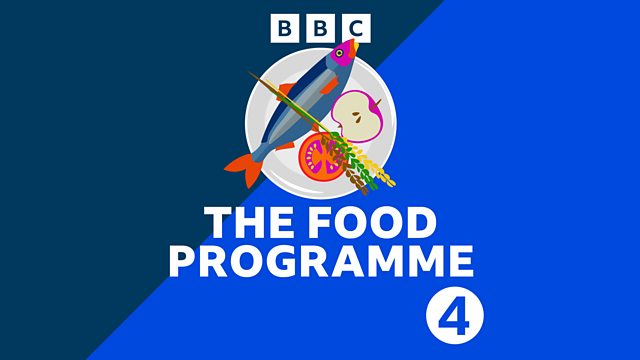The Wild Venison Project
Sheila Dillon meets a celebrity game chef, a deer stalker and a group of high school burger makers who are promoting wild venison as a sustainable, affordable meat choice.
Eighty six year old Fergie MacDonald remembers shooting Red deer as a nine year old boy. The Second World War was on and food was scarce in his home village in the rugged Moidart peninsula, in the Scottish Highlands. It was of course a crime, as he freely acknowledges - the deer belonged to the local estate. But his family had to eat. His mother roasted, boiled and salted the venison and, as Fergie says, "you acquired a taste for it."
Today he's still eating vension, but it comes from animals shot legally by his son John, who is a deer manager, stalker and butcher. John has been running his own wild venison business since 1998 and in that time he's seen immense changes. He says there's much more public awareness about the benefits of eating a lean, protein-rich meat, amid concerns about the environmental damage caused by red deer over population. John sells venison cuts to passing trade from his roadside shop as well as providing meat for the family's hotel, Mingarry Park, run by his wife Emma. Emma says venison dishes are always on the menu and vegetarians have even been willing to try them.
But John's business is not without its headaches. He tells Sheila Dillon he has to work within strict culling targets imposed by the Scottish government and he's concerned that deer numbers locally are falling too quickly. Since Covid and Brexit, he finds it hard to get staff, so much so, that Fergie regularly helps out in the shop and his 73 year old Mum, Maureen, still makes all the burgers.
Further north on the shores of Loch Ness, campaigners have been giving school children an introduction to the complexities of deer management and venison production. Earlier this year, in a project called 'Hill to Grill', pupils at Glen Urquhart High School joined a deer stalker on the hills and were shown how the animals are butchered and processed. Back in school, they devised their own recipes and took part in a Dragon's Den-type competition to market and brand their dishes.
One of the organisers, ecological consultant, Dr Linzi Seivwright, says it was a fantastic learning experience for the children. "It's vital to move away from the traditional image of venison as a food for the wealthy and to show local communities that it is an affordable and versatile choice."
Sheila complimented the teenage chefs.. "These are so moist and delicious - so much nicer than burgers from a fast food chain," she said.
Hundreds of miles away in Gloucestershire, the environmental problems caused by large deer herds are much more critical, according to leading campaigner and deer manager, Mike Robinson. He says that numbers have got out of control, particularly since Covid and that culling targets are more difficult to enforce in England than in Scotland, because estates are smaller and fragmented. He shows Sheila some of the damage in an estate forest caused by grazing deer.
He estimates that there may be nearly 3 million deer in England, mainly fallow, roe and muntjac and that stricter controls are necessary. He says the Westminister government is now using a carrot and stick approach with landowners – offering woodland grants which are conditional on professional deer management plans – and he's hopeful that this will be effective.
As well as managing deer, Mike Robinson is a chef and restaurateur with several award-winning restaurants. He specialises in wild food and recently launched The Wild Venison Project – an initiative to get more chefs across the UK to put venison on their menus and to persuade the public to buy and cook it at home. He cooks several recipes for Sheila to demonstrate the versatility of the meat and he says: "I suppose you could say I am obssessed with vension. It just makes so much sense to eat a meat which is wild, healthy and nutritious and which also helps address environmental problems."
Mike runs Deer Box, an online food site and believes selling directly to the public is the most cost effective and efficient way for producers to operate because most supermarket chains have their own internal purchasing systems which are difficult for small producers to work with. He set up Deer Box during Covid, with a state of the art processing unit and offers everything from expensive steak cuts to mince, steak pieces and burgers. He is also a patron of The Countryside Food Trust, a charity which distributes game to food banks and communtiy projects.
It's not the first time Sheila Dillon has reported, for The Food Programme, on efforts to increase the consumption of wild venison. Will they have more success this time? Given the growing interest in food sustainability and environmental concerns, campaigners Mike Robinson, John MacDonald and Linzi Seivwright are convinced their message is finally beginning to pay dividends.
Last on
Broadcasts
- Sun 2 Jul 2023 12:32Βι¶ΉΤΌΕΔ Radio 4 FM
- Mon 3 Jul 2023 15:30Βι¶ΉΤΌΕΔ Radio 4
Download this programme
Subscribe to this programme or download individual episodes.
Can comfort foods really make you feel better?
Yes they can, says Sheila Dillon.
Podcast
-
![]()
The Food Programme
Investigating every aspect of the food we eat


